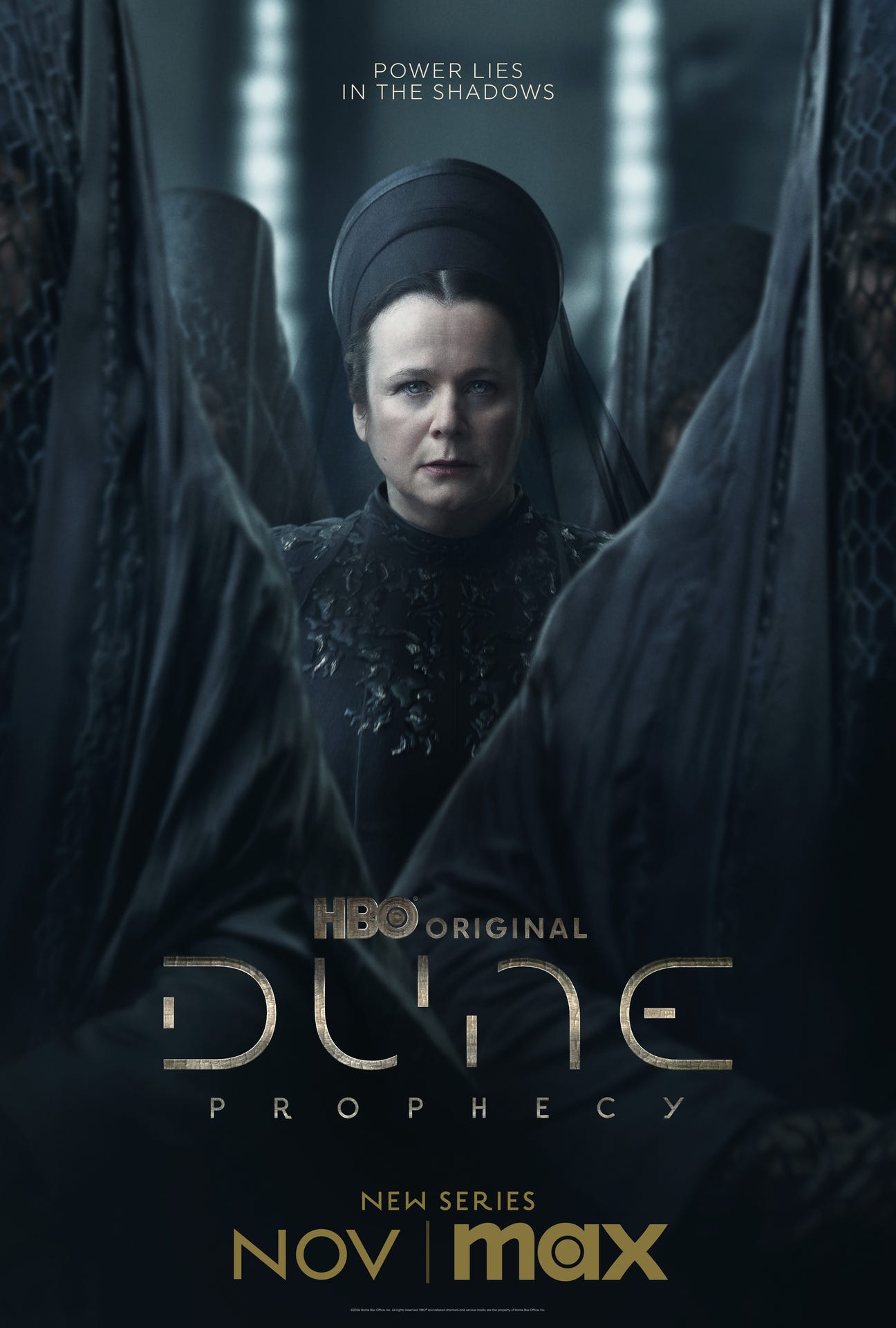Of Prequels, Prologues, and Dune: Prophecy
Introducing science fiction and fantasy worlds on screen
Dune Part 1 was my favourite new release of 2021. Although moviegoers packed the theatre, they were so quiet I could hear every whisper in the dialogue. No one fidgeted or scrolled on their phone. Denis Villeneuve distilled Frank Herbert’s novel to its essence and guided viewers into a world of space travel, feuding families, and religious fervour with an unseen hand.
So I had high hopes for Dune: Prophecy, which debuted on HBO Max last weekend (Crave TV in Canada). And it didn’t deliver.
This isn’t a review of Dune: Prophecy. More an analysis of the first episode (there be spoilers ahead). But so many of the lessons from my last post, about introducing a story, seem to apply here.
Prophecy is set 10,000 years before the Dune movies. It focuses on the Bene Gesserit, an all-female religious order who advise the powerful while secretly pulling the strings themselves.
At least, I think that’s what the show runners intended. The first episode introduces an ensemble cast with multiple storylines that each get similar emphasis. Alongside the nuns, there’s a conflicted emperor, a headstrong princess, and a mysterious soldier recently returned from Arrakis (the desert planet at the heart of the Dune movies). It’s not clear who the protagonist is or what’s at stake.
The episode begins with a monologue by Valya Harkonnen (Emily Watson), the leader of the Bene Gesserit. She explains that, a hundred years earlier, humanity fought a war against thinking machines, banishing robots and computers from the Dune-iverse. She shares a brief family history of the Harkonnens and their rivals, the Atreides, who will later face off in the Dune movies. Then she monologues a bit more about the Bene Gesserit.
The problem is, we didn’t need to know any of this at the outset. The robot ban only becomes relevant later and could have been introduced at that time (more on that below). As for the family history, while both houses appear in the first episode, their rivalry doesn’t. And neither house appears to be all that important in this period.
As for the Bene Gesserit, the show assumes viewers have seen the movies and therefore shouldn’t need to tell us who they are. Yet they still info dump about the sisterhood without telling viewers what they need to know: what do they want in this era and why does it matter?
We do get hints. In the first episode, the sisterhood seems to have two goals: recruit the emperor’s daughter into their order and marry her to a nobleman’s nine-year-old son. But neither goal makes much sense. The Bene Gesserit prefer to rule from the shadows. Why do they want a sister on the throne? And as for the marriage, they don’t even check whether this match advances their eugenics project until after they’re already pushing it, which seems downright negligent for a group of master manipulators.
Supposedly, it’s because of a prophecy. But the prophecy is so vague I can’t recall what it was or even whether the sisters are trying to enable it or avert it. I can’t connect character actions to stakes if I don’t know what those stakes are. And without clear stakes, the Bene Gesserit’s immediate goal—controlling the empire’s leaders and breeding better ones—makes them look like the bad guys.
So. Why didn’t the prologue work? Sure, the prologue tells rather than shows. But, more importantly, it tells the wrong thing.
Compare this opening to The Fellowship of the Ring. Fellowship also begins with a monologue, this time by the elf queen Galadriel. She explains how the Dark Lord Sauron created the One Ring, how he used it to wage war on Middle Earth, and how he was defeated—for a time. She explains how the ring corrupted everyone who touched it. And she ends by introducing “the most unlikely creature imaginable”: a hobbit.
Why does this prologue work? Because it tells a story. Although it’s history, it’s not an info dump. It’s the story of the film’s major villain: the One Ring. We learn what it wants, and what will happen when it gets its way.
The story of the One Ring shows us the film’s stakes. It introduces the four free peoples of Middle Earth: men, elves, dwarves, and hobbits. It shows their desires, their struggles, and their vulnerability to the One Ring. It introduces the major themes. It shows the choices that will haunt the series’ two main protagonists, Frodo and Aragorn: Bilbo’s theft of the Ring and Isildur’s refusal to destroy it.
And it leaves the audience with a question: why are hobbits important?
And then immediately cuts to Frodo Baggins.
Dune: Prophecy’s opening monologue doesn’t tell a story. Not really. It doesn’t have a main character or even a clear villain. The “thinking” machines look like mindless killer robots. And they were defeated. Nothing in the opening episode suggests the machines will be the villains of Prophecy (although modern Hollywood loves cheap twists, so you never know). It’s just information, and it’s information we don’t need yet.
If I was rewriting Dune: Prophecy, I would skip the monologue and take the Game of Thrones approach:
Begin with a scene that shows the primary threat or villain in a way that makes the stakes clear (the white walkers are coming!)
Then give us your protagonist, their core inner conflict, and a reason to root for them (Ned Stark executes a deserter—while his children watch)
Dole out the history and politics through dialogue (Ned mentions the Targaryen kings who ruled before Robert Baratheon; the Starks talk about the white walkers; the Targaryens talk about reclaiming the throne; the Lannisters talk about the Hand’s death)
Do all that, and when the inciting incident happens (the king rides for Winterfell!), the audience will know the stakes and how the protagonist’s choices impact them.
But Prophecy didn’t do that. Instead, the opening episode is full of missed opportunities that suggest the writers knew what they should do, but not how to do it. There’s a scene where the princess’ fiancé (a literal child) is caught playing with a toy robot at a party. The characters shrink from the robot, which I suppose is meant to show that they fear it, but many look more surprised than scared. After the soldier stops the robot, the emperor and his daughter face off over punishing the boy.
Unfortunately, the audience doesn’t yet know what the punishment is for possessing a robot. And we still don’t know by the end of this scene. The characters act as though this is a very serious offence with a very serious punishment. But then the emperor forgives the boy and even lets him keep the robot. No one asks where the toy robot came from or calls for the boy’s father’s head. How serious is this ban, anyway?
The writers could have had an adult explain the ban to the boy. Imagine the emperor forced to arrest the boy or his father and hunt down the manufacturer. Imagine the princess grabbing the boy’s arm and shouting at him until he cries. Imagine a Bene Gesserit sister reciting, in a cold, authoritative manner, how thinking machines nearly destroyed the human race. That would show the audience something about this world. Without the clunky prologue.







Thanks for articulating the just vague wtf feeling I had all through episode 1.